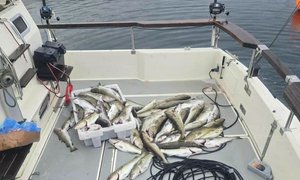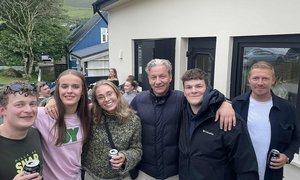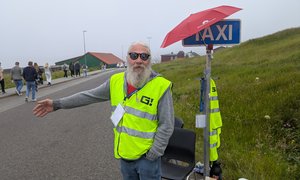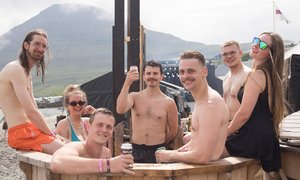by Louis Wilson
In the early years of the century the threat was all too visible to the Faroese. Large fleets of British steam-powered trawlers could be seen crowding the fishing grounds right up to a mere three miles away from the shoreline. The effect was to squeeze Faroese inshore fishermen (útróðrarmenn) out of teir home waters.
Later on in the 1960?s the Faroese took the long overdue step of extending their fishing limits. They were met with punitive bans on Faroese fish landings at British ports.
Britain?s apparent disregard for its small neighbour to the North continued right into the 1990?s when they pressed their outrageously unfair claim for sovereignty on sub-sea resources in far into Faroese waters. Commenting on this in his own inimitable way, the then Danish Foreign Minister, Uffe Elleman-Jensen observed that this encroachment would have enabled the inhabitants of Suðuroy (the southernmost of the Faroe Islands) to spit into British waters. Further salt was rubbed into the wound by way the British Government appeared to promote the animal welfare groups campaigning against the pilot whale hunt. These were groups pledged to »bring the Faroes to their knees« by means of an economic boycott who routinely smeared Faroese people as bloodthirsty barbarians. Yet they were still able to get representation on official UK delegations to the International Whaling Congress.
As part of their engagement with the Faroe Islands the British Government will undoubtably start inviting prominent politicians and influential opinion formers on official visits to Britain. Their programmes will be placed in the hands of the practiced professionals from the Foreign Office who will do everything to ensure that the visitor leaves with the best impressions of the host country. They will be wined and dined and strenuous efforts will be made to meet whatever individual wishes they have with regard to sightseeing and meeting eminent personalities.
No doubt the Løgmaður will feature prominently on the invitation list. And i think we can confidently expect that he will be received with the ceremony appropriate to a national leader. This would certainly be a contrast to the experiences of his predecessors. I don?t think there was much ceremony at the Fish Dock in Grimsby when old Hákun Djurhuus stepped off a trawler to pursue fishery negotiations with the British in the 1960?s. Neither was there much recognition of Atli Dam?s status when he was in Britain on a similar errand in the following decade. Interviewes on BBC television, he was introduced as »a Faroese member of the Danish delegation«.
It is obviously easy to be cynical about the kind of British »charm offensive« we can now expect and conclude that beneficiaries of it will be bought off. This would be true if their heads are turned by such VIP treatment. But if people go into such visits with their eyes open then the links that are created can only help the Faroe Islands. The British clearly have an agenda based on their national interests to pursue in their engagement with the Faroe Islands. They want visitors to return to their countries favourably disposed towards Britain. There is nothing dishonourable about this. It is a normal tool of diplomacy. But it does put the onus on the Faroese to decide what they want out of the relationship and to pursue this with equal determination. There must after all be large areas of mutual interest. This means it is time for some strategic thinking about relations with the Faroe Islands closest neighbour to the South.
A new relationship with Britain offers an opportunity to lessen dependence on Denmark and further erode the »tunnel vision« which sees Copenhagen as the sole gateway to the outside world. This must surely be a healthy development irrespective of whether the Faroese Governsment?s aim is fullveld (sovereignty status?) of a reshaping of the relationship between nations in the Danish Kingdom (Ríksfelagskap). The British Empire is no more although the Faroese could have been forgiven for thinking otherwise when the UK sought to extend its territory onto their doorstep in the early 1990?s. Instead Britain is finally carrying out constitutional reform in a conscious attempt to adapt to its modern place in the world. New centres of poser have been created in Scotland and Wales. This creates further opportunities for the Faroese to develop all sorts of political, economic, social, eduvational, cultural and sporting links on a more equal footing than has previously been possible. In terms of specifics, the areas which immediately come to mind for the Faroese to focus on are:
?Collaboration in developing Oil and Gas resources in the North Atlantic.
?Encouraging tourism from Britain.
?Persuading Britain to take account of Faroese interests in EU negotiations.
?Pursuing opportunities for Faroese to study and work in UK. Currently, Norwegians and Icelanders are allowes to work in the UK but Faroese have to obtain Danish Passport and pass themselves off as EU citizen.
?Neutralise British Government support for any renewed campaign against Grindadráp.
In this new relationship it is ennential that the Faroese to not remain passive partners waiting to be swept along by the British agenda. For a start they could take the initiative in forming links with the new Scottish Home Government in Edinburgh. Donald Dewar and his colleagues would surely be interested in the Faroe Islands experience of operating Home Rule over the past 50 years. I would also suggest that the Faroese should start their own »charm offensive« by inviting influential British people to the Faroe Islands so that tey can experience this unique country at first hand. Many of them would no doubt return to Britain captivated by the beauty of the scenery and the special qualities of the people in the Same way as William Morris, John Buchan and John Betheman and many of their compatriots have been over the years. These kind of attachments could be of inestimable benefit to the Faroe Islands in future relations with Britain.













